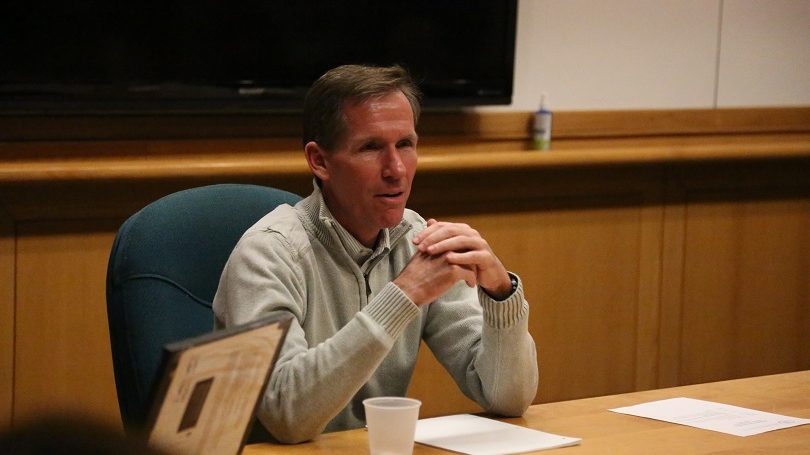
- Public Policy
- Leadership
- Funding
- News & Events
- About the Center
Back to Top Nav
Back to Top Nav
Back to Top Nav
Back to Top Nav
Professor Ronald Shaiko started off his January 12 Rockefeller Leadership Fellows session simply – defining exactly what he meant by civil society. As he put it, civil society is the “social and political space between the citizen and the state.” Organizations like Rotary clubs, medical not-for-profits, and environmental advocacy groups all fit in this space. Beyond these organizations merely existing though, Professor Shaiko emphasized that the US government actually facilitates their existence, through “carrots” like tax exemptions and reduced-cost postage.
Professor Shaiko then proceeded to engage the Fellows, by encouraging them to apply this understanding to Dartmouth. For example, he encouraged the Fellows to consider: in what ways are the leadership skills that you have developed at Dartmouth applicable to civil leadership? Learning to lead – to bring constituents in when there is seemingly no incentive – is something each Dartmouth student struggles with in their particular corner of campus. Different groups and different leaders on campus use motivating forces – namely, food – to get other members of the Dartmouth community interested in their events. Professor Shaiko encouraged the Fellows to apply this anecdotal civil leadership at Dartmouth to civil leadership in their futures – this poses the resonating question, how can one be a leader when followers are unmotivated?
From there, Professor Shaiko extended the conversation into a discussion of what he calls “thick trust” and “thin trust.” As he puts it, thick trust is like bonding – establishing and strengthening links between already like-minded individuals; in other words, a process that facilitates homogeneity. In contrast, thin trust is more like bridging – bringing people together from different corners of the world and forcing them to interact across the barriers between them; therefore, a process that inherently fosters heterogeneity.
From these definitions, Professor Shaiko encouraged the Fellows to consider bonding and bridging at Dartmouth – what groups are we a part of that exemplify bonding? What groups are we a part of that exemplify bridging? If RLF, itself, an example of bonding, bridging, or both? These questions opened the floor to in-group discussions, and also provided Professor Shaiko with a platform to share some of the thoughts he has developed over his 16-year career at Dartmouth. In his opinion, Dartmouth does a great job of encouraging bonding – anything from affinity houses to Greek organizations, where individuals of similar demographics, values, and experiences come together – as he put it, “birds of a feather flock together.” However, he believes that Dartmouth does not do as well at bridging – he questions, outside of the housing system and First-Year Trips, where are the programs that mandate interacting with and learning from peers? Furthermore, Professor Shaiko raised the point that those of similar backgrounds and experiences will find each other naturally; the College doesn’t need to devote resources into that. Rather, he emphasized that the College should devote increased resources into bridging, in order to supplement the bonding that will naturally occur.
If anything, Professor Shaiko should be commended for his ability to go above and beyond. As a professor, he has taken stake in far more than just his classroom and his research. Rather, it is abundantly clear that he cares deeply about the community he is a part of. This care takes the form of constant active thought, critical reflection, and frequent brainstorming on means of improvement and community-betterment. The Fellows consider themselves lucky to have engaged with a professor who cares so deeply about the betterment of their community.
Written by Terence Hughes, Class of 2017 Rockefeller Leadership Fellow